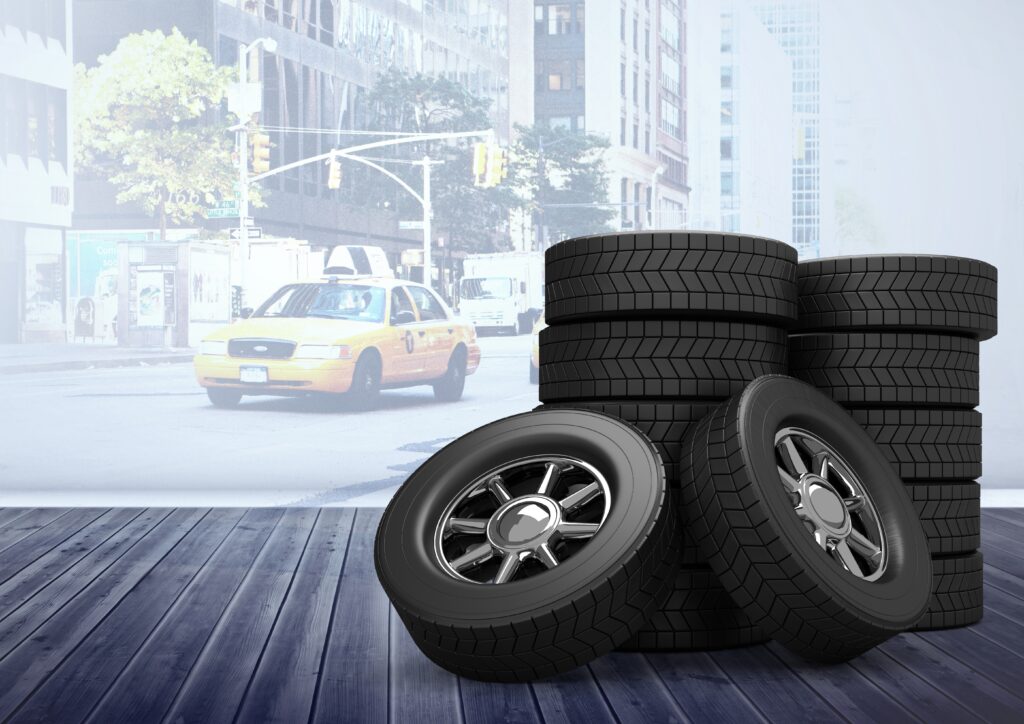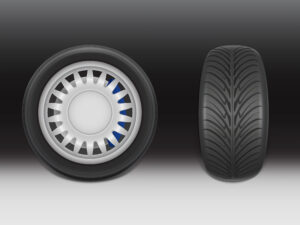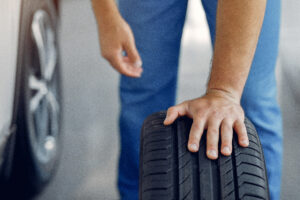Car Tyre Life: How Long Do Car Tyres Last & When Should You Replace Them?

Digital composition of stack of tyres in garage
When it comes to vehicle safety, car tyre life is a crucial factor that often gets overlooked. The condition of your tyres directly impacts your car’s handling, braking, and overall safety on the road. So, how long do car tyres last? On average, car tyres last around 5 years or 50,000 km (whichever comes first), but this lifespan can vary based on several factors like driving habits, road conditions, and maintenance practices. Understanding the average tyre lifespan and learning how to extend it can save you from unexpected tyre failures, reduce overall maintenance costs, and ensure a smoother, safer driving experience. In this article, we’ll explore the key factors that affect car tyre life, how to identify when it’s time to replace your tyres, and the best practices to increase their longevity.
What is the Average Lifespan of a Car Tyre?
The average tyre lifespan of a car is typically around 5 years or 50,000 km, but this can differ depending on several factors. These include the type of tyres (Apollo, MRF, Bridgestone, Ceat, Yokohama, Michelin, Goodyear, Continental, JK, Maxxis, Pirelli, Vredestein, Hankook, BF Goodrich), driving habits, road conditions, and vehicle usage. Some tyres may last longer, while others may need replacing sooner.
How long do car tyres last? The answer is not one-size-fits-all. While many vehicles use standard tyres, there are different types designed for specific purposes—such as performance tyres, all-season tyres, and winter tyres—which all have varying lifespans. Tyre longevity is also affected by the weight of the vehicle, with heavier vehicles generally putting more stress on tyres, causing them to wear faster.
Key Factors Affecting Tyre Lifespan:
- Tyre Type: Performance tyres often wear out quicker than regular tyres because they’re designed for better traction.
- Driving Habits: Aggressive driving, such as speeding or frequent hard braking, causes tyres to wear out more quickly.
- Road Conditions: Poor road conditions, including potholes and rough surfaces, significantly shorten tyre life.
- Maintenance: Regular maintenance, including tyre rotations and pressure checks, can help extend the average tyre lifespan.
Factors Affecting Car Tyre Life
There are several variables that can either extend or shorten the car tyre life. Below are the primary factors you should keep an eye on to ensure your tyres last as long as possible.
a) Driving Habits
How you drive has a direct impact on the lifespan of your tyres.
- Frequent Hard Braking: Sudden braking can lead to uneven wear, especially on the tread. This results in a loss of grip and a reduced lifespan.
- Sudden Acceleration: Rapid starts increase the friction between your tyres and the road, which accelerates wear.
- High-Speed Driving: Driving at high speeds for prolonged periods generates heat, causing rubber degradation and potentially reducing the tyre’s lifespan.
b) Road Conditions
The surface of the roads you drive on plays a huge role in determining how long your tyres will last.
- Smooth Roads: Well-maintained highways put minimal stress on tyres, allowing them to last longer.
- Potholes and Rough Roads: Regularly driving over potholes or uneven roads causes wear, sidewall damage, and even punctures. If you need a tyre shop in Mumbai, visit locations like Tyre Shop in Goregaon and Tyre Shop in Borivali.
- Road Debris: Objects like nails, glass, and sharp rocks can puncture tyres, leading to premature replacements.
c) Climate and Temperature
Temperature fluctuations have a significant effect on tyre durability.
- High Temperatures: Hot climates cause the rubber in tyres to break down faster due to heat exposure, which leads to increased wear.
- Cold Temperatures: In colder climates, tyres may become stiff and more prone to cracking, leading to reduced traction and lifespan.
- Optimal Conditions: Moderate temperatures are the best for maintaining the quality of your tyres and preventing unnecessary damage.
d) Tyre Pressure & Maintenance
Maintaining proper tyre pressure is vital for ensuring your tyres last longer.
- Underinflation: Low tyre pressure increases rolling resistance, causing tyres to wear faster, particularly on the outer edges.
- Overinflation: On the flip side, overinflated tyres wear out in the center, causing uneven tread wear and reduced lifespan.
- Regular Inspections: Regular tyre checks, including pressure and alignment, can prevent issues like uneven wear that could lead to premature replacement.
e) Load Capacity & Tyre Type
Overloading your vehicle places extra strain on the tyres.
- Overloading: Carrying more weight than your vehicle’s recommended capacity puts excess pressure on the tyres, causing them to wear out more quickly.
- Tyre Type: Tyres designed for different purposes (such as off-road tyres or high-performance tyres) tend to have different lifespans. For example, tubeless tyres last longer and are generally more durable than tyres with inner tubes.
Signs That Indicate You Need a Tyre Replacement
Your tyres will give you clear signs when they need replacing. Watch out for these indicators:
a) Tread Wear
The tread of your tyre plays a crucial role in traction.
- Tread Depth: Use a tread depth gauge to measure how much tread is left. The legal limit for tread depth in many countries is 1.6mm. If the tread has worn down to this level, it’s time for a replacement.
- Tread Pattern: If the tread shows signs of uneven wear, it may indicate alignment issues or that you need to replace the tyres sooner.
b) Sidewall Cracks
Check the sidewalls of your tyres for cracks or tears. Over time, exposure to UV rays, dirt, and road chemicals can cause the rubber to deteriorate. Small cracks can lead to tyre blowouts if not addressed.
c) Bulges and Blisters
Bulges on the sidewalls of tyres are an indication of internal damage caused by impacts with road debris or hitting potholes. These can lead to tyre failure, so it’s important to replace tyres with bulges immediately.
d) Frequent Punctures
Frequent tyre punctures are a sign that your tyres have become brittle and worn out. If your tyres are continually being punctured, it might be time to replace them.
e) Strange Noises or Vibrations
If you hear odd noises or feel vibrations while driving, it could be a sign of alignment issues or worn-out tyres. In this case, replacing your tyres is recommended to ensure safety.
How to Extend the Life of Your Car Tyres?
There are several things you can do to extend your car tyre life and get the most value out of your tyres.
a) Regular Tyre Rotation
Rotating your tyres ensures that they wear evenly. Depending on your vehicle and driving conditions, you should rotate your tyres every 6,000 to 8,000 km. This helps avoid uneven tread wear, which could shorten the average tyre lifespan.
b) Proper Storage & Cleaning
If you’re storing your car for an extended period, store the tyres in a cool, dry place away from direct sunlight. Clean the tyres regularly to remove dirt, chemicals, and other debris that can degrade the rubber.
c) Wheel Alignment & Balancing
Misalignment causes uneven tyre wear, so it’s essential to have your wheel alignment checked regularly. Unbalanced wheels can also lead to excessive wear, making balancing important as well.
d) Avoid Overloading & Excessive Speeding
Overloading your vehicle puts unnecessary pressure on your tyres. Similarly, excessive speeding increases tyre friction, generating heat that can cause premature wear. Stick to the recommended weight capacity and speed limits for a longer car tyre life.
When Should You Replace Your Car Tyres?
Knowing when to replace your tyres is critical for both safety and performance. Here are some guidelines:
- Manufacturer’s Recommendations: Always refer to your vehicle manufacturer’s guidelines for when to replace tyres. In most cases, tyres should be replaced every 5 to 6 years.
- Check for Tread Depth: If the tread depth is at or below 1.6mm, it’s time for a replacement.
- Expert Inspection: Have a professional check your tyres annually to ensure that they are safe to use.
Final Thoughts: Safety Comes First!
Your tyres are one of the most vital components of your vehicle, and driving with worn-out tyres significantly increases the risk of accidents. By maintaining your tyres and replacing them when necessary, you not only ensure your safety but also save money on repairs and fuel efficiency. Regular maintenance, correct tyre pressure, and good driving habits are essential to prolonging the car tyre life and avoiding premature replacements. Remember, the investment in quality tyres and proper care pays off in the long run!
Need a Tyre Check or Replacement? Contact KwikFix Auto!
KwikFix Auto offers expert tyre inspection, repair, and replacement services in Mumbai.
Get doorstep service for tyre puncture repair, pressure checks, and full tyre replacements.
Book now and ensure your vehicle stays safe on the road!
Frequently Asked Questions
Q1. How long do car tyres last?
Ans. On average, car tyre life is 5 years or 50,000 km, but it can vary depending on driving habits, road conditions, and maintenance.
Q2. How can I extend my tyre life?
Ans. Regular tyre rotations, proper alignment, maintaining correct tyre pressure, and avoiding overloading your vehicle are key to extending the average tyre lifespan.
Q3. When should I check my tyre pressure?
Ans. It’s recommended to check your tyre pressure every month and before long trips. Underinflated or overinflated tyres can lead to premature wear.
Q4. How can I tell if my tyres need replacing?
Ans. Check for tread wear below 1.6mm, sidewall cracks, bulges, or frequent punctures. If you notice any of these signs, it’s time to replace your tyres.
Q5. Can I replace just one tyre?
Ans. While it’s possible to replace just one tyre, it’s often recommended to replace tyres in pairs or all four to maintain balance and safety.
Q6. Why do tyres wear out faster in hot weather?
Ans. High temperatures cause the rubber to degrade faster, which leads to a reduction in the car tyre life. Proper tyre maintenance is important to mitigate this effect.
Q7. Can tyres be affected by cold weather?
Ans. Yes, extremely cold weather can cause the rubber to harden, increasing the likelihood of cracks and reducing the lifespan of the tyres.
Q8. Is it worth investing in premium tyres?
Ans. Premium tyres often provide better performance, safety, and longevity. Although they may cost more upfront, they can be more cost-effective in the long run due to their extended lifespan and improved safety features.





